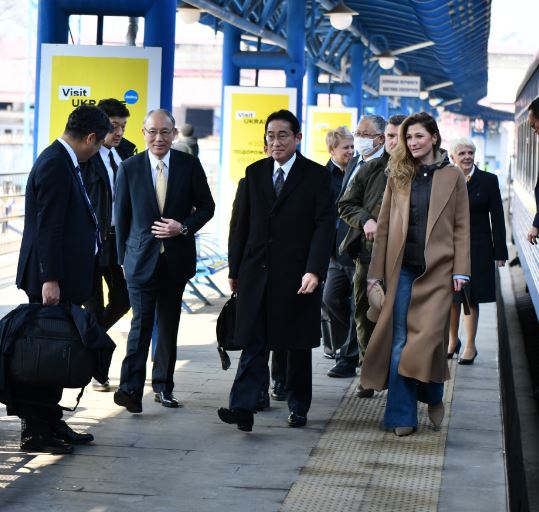Beijing: China Tuesday hit out at Japan after its Prime Minister Fumio Kishida made a surprise visit to Ukraine and overshadowed Chinese President Xi Jinping’s meeting with his Russian counterpart Vladimir Putin in Moscow, saying Tokyo should do more to de-escalate the situation rather than aggravating it.
Beijing was caught by surprise as Kishida, who was on an official visit to New Delhi from March 19-21, entered Poland from India using a secretly chartered plane instead of the standard government aircraft, Japanese TV channel NHK reported.
The chartered plane left Tokyo’s Haneda Airport at around 8 pm Sunday, about three hours before a government plane carrying Kishida departed for India.
After wrapping up his scheduled events in India, the prime minister secretly boarded the waiting plane in the early morning hours of Tuesday, the Japan Times daily quoted an NHK report.
Kishida’s visit to Ukraine and his scheduled meeting with Ukrainian President Volodymyr Zelenskyy in Kyiv stole the limelight of Xi’s Moscow visit aimed at projecting himself as a global peacemaker after Beijing successfully brokered a peace deal between Iran and Saudi Arabia to end their hostilities.
In a statement on Kishida’s visit to Ukraine, the Japanese Foreign Ministry said he will express to President Zelenskyy his respect for the courage and perseverance of the Ukrainian people standing up to defend their homeland under Zelenskyy’s leadership.
“At a summit meeting with President Zelenskyy, Prime Minister Kishida will resolutely reject Russia’s aggression against Ukraine and unilateral changing of the status quo by force, and reconfirm his determination to uphold the international order based on the rule of law,” it said.
Kishida will “directly convey our solidarity and unwavering support for Ukraine” as Prime Minister of Japan and the current chair of G7 countries, it said.
Asked about Kishida’s visit, the Chinese Foreign Ministry spokesman Wang Wenbin said the international community “should keep to the right direction to promote the peace talks and create conditions for a political settlement of the Ukrainian crisis”.
“We hope the Japanese side will do more to de-escalate the situation instead of the opposite,” he told a media briefing here.
“China’s position boils down to promoting peace talks and China will continue to uphold an objective, just position and work with the world to play a constructive role in the political settlement,” he said.
On whether Xi will speak to Zelenskyy, he said: “Our position is consistent and clear. We keep communication with all parties”.
He shot back when asked whether China will work with the US to stop the war, saying the US should be asked whether it would like to promote peace talks and stop the war.
“China would like to work with the international community to play a constructive role in the Ukraine crisis,” he said.
On US Secretary of State Antony Blinken’s assertion that the world should not be fooled by the Russian-Chinese peace plan for Ukraine, Wang said China’s peace plan covers all aspects including respect for sovereignty, ceasefire and stopping of unilateral sanctions.
He claimed that many countries support China’s peace plan as they want de-escalation.
“China is not a creator of the Ukraine crisis, not a party to the crisis and does not provide weapons to any side of the conflict and the US is in no position to point fingers at China and blame it,” he said in response to Blinken’s assertion that Beijing is providing a “diplomatic cover” for Russia’s war in Ukraine.
“The US should see China’s efforts more objectively than holding on to the Cold War mentality and stop escalating tensions,” he said.
In Tokyo, US Ambassador to Japan Rahm Emanuel tweeted that Prime Minister Kishida is making a “historic visit” to Ukraine to protect the Ukrainian people and promote the universal values enshrined in the UN Charter.
“Approximately 900 kilometres away, a different and more nefarious partnership is taking shape in Moscow,” Emanuel said.
— ラーム・エマニュエル駐日米国大使 (@USAmbJapan) March 21, 2023
The coincidental timing of Xi and Kishida trips “does indeed create a stark contrast,” James D J Brown, said political science professor at Temple University in Japan.
“It presents the image of two blocs, with Japan and Ukraine on the side of democracy, and Russia and China representing an axis of authoritarianism,” he told the Japan Times.
In Moscow, Xi and Putin held a “restricted session” of talks on the second day of the Chinese leader’s three-day visit, following up on their four-hour talks Monday. Xi said Tuesday that he has invited Putin to travel to China for the third Belt and Road Forum for International Cooperation to be held this year.
While meeting Russian Prime Minister Mikhail Mishustin, Xi said that the invitation was made in his informal meeting with Putin.
It fits the historical logic that Chinese leaders take Russia as a primary choice for their overseas visits, Xi said, referring to his visit, his first overseas trip after getting endorsed for an unprecedented third term as president and head of the military by the Chinese Parliament this month.
He said China and Russia are each other’s biggest neighbours and comprehensive strategic partners of coordination, and that such a relationship has withstood the test of the world’s profound changes.
Xi also called for continuous regular meetings between the Chinese premier and Russian prime minister, and invited Mishustin to visit China, the state-run Xinhua news agency reported.
PTI
